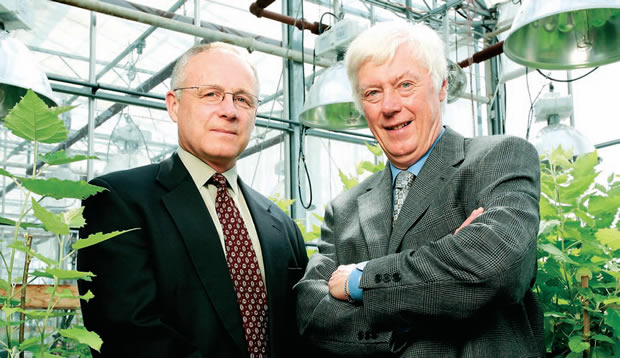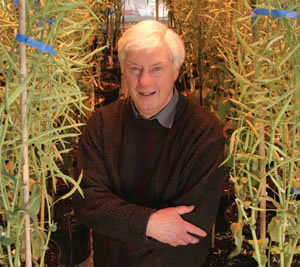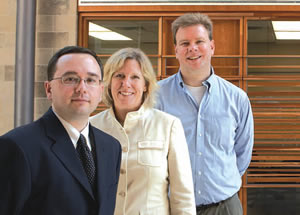Real Money... Real Business

Alan Ridgeway, a PhD in biochemistry from UWO, spent nearly 10 years in scientific labs before deciding to change course and embark on his MBA studies at Queen’s. He saw the program’s then-focus on business education for those with a background in science and technology as a perfect fit.
Alan’s classmate Amie Sergas, a BSc in biotechnology from Brock University, had also come from the scientific sector, having worked in a bio-pharma start-up and later at Vancouver’s StemCell Technologies Inc.
Both expected their MBA studies to further their business aspirations, especially in the venture capital area to which both students were drawn. Neither anticipated being part of a team of student venture capitalists who would actually recommend whether or not to invest in new ventures.
The paths of Alan and Amie, both MBAst’06, crossed when they participated in Canada’s first student-advised venture capital fund and one of the most ambitious and innovative curriculum projects offered through the School’s Centre for Business Venturing.
Launched in 2006, the (TVF) enables students from the Commerce and full-time MBA programs to gain hands-on experience in managing a $3-million investment fund, making decisions that affect real-life companies.
Early-stage companies seeking investments make their pitch directly to student teams, who then take on the thorough and meticulous work of assessing the opportunity and conducting due diligence. Students begin by reviewing the business plans and executive summaries of the various companies. They then invite a select number of them to make a detailed presentation and answer questions. At this point, the students narrow down the list to three to five companies. Next, students more vigorously investigate company claims and operations, checks that can include everything from a review of their intellectual property holdings to the dimensions of their facilities.
Ultimately, the students decide whether to invest and, if yes, under what terms. Their recommendations are then taken under advisement by the TVF’s Investment Advisory Board, a committee of seasoned entrepreneurs, angel investors and venture capitalists.
“It’s a hands-on translation of theory into practice. It’s real money, it’s real business, and it’s serious business. This is the ‘look the entrepreneurs in the eye’ experience as they’re pitching their companies,” says Elspeth Murray, Associate Professor and Director of QSB’s Centre for Entrepreneurship, Innovation & Social Impact. The Centre, a leading source of knowledge and expertise in the creation, leadership and management of new ventures, has a key mandate to embed new venture thinking into the School’s curriculum.
“We completely replicate the experience the students would have if they were full-time venture capitalists,” says Elspeth, who is also the CIBC Faculty Fellow in Entrepreneurship. “It’s unique in that respect. There is only so much you can learn in the classroom through case studies, however great they are, or from guest speakers.
“We are able to look at the companies’ portfolios and see whether they are on track and turn out to be good investments. This becomes a way to revisit the assumptions made when we put the money in, to see if they panned out and whether there is any way to effect any changes,” Elspeth says.
Since the TVF’s founding, the School has seen close to 50 students hone their entrepreneurial acumen and investment judgement through participation in the reality learning exercise.
Amie and Alan were part of the TVF program team that recommended an investment of $100,000 in Pathogen Detection Systems Inc. of Kingston, a developer of fibre optic technology for rapid, automated detection of bacteria in water systems.
Alan remembers the fun of interacting with entrepreneurs who had exciting new ideas. “We were seeing how companies come in and pitch for money. It was a good first glimpse into the world of venture capital for someone interested in that field. It felt like being in on the ground floor when potentially developing that technology.
“And it was the first financial modeling I had ever done outside a classroom assignment. It was an opportunity to actually dig into the financial statements of a company, do some financial modeling, and see if the amount of money the company was asking for made sense. That was challenging, and I was totally learning on the fly.”
Amie notes that her involvement in the TVF helped her understand the role that personal relationships play in winning the confidence of investors.
“A lot goes into the personal side that is often missed or misunderstood by the entrepreneur. They get so caught up in the technology, the numbers and the mechanics of the business they’re pitching that they discount the importance of how they present themselves as leaders of a venture,” she says.
“It’s easy to think that the investment process is quite calculated, but in fact, it’s not. A lot depends on relationships among the people involved and the trust that is established. If the people aren’t right, it’s a ‘no-go’.”
These are just some of the insights she gained that have helped her in her current role as Program Manager for the Business Mentorship and Entrepreneurship Program (BMEP) at MaRS Discovery District, a $17-million part of Ontario's Market Readiness Program, set up to provide support services and mentorship to early-stage technology companies.
“We Completely Parallel The Experience Students Would Have If they Were Full-Time Venture Capitalists.”
 David Dennis, CEO, Performance Plants Now in its third year, the TVF has also invested $50,000 in Datec Coating Corp. of Milton, an advanced materials company using novel ceramic coating technology for applications in the automotive plastics and appliance industries, and $175,000 in Performance Plants Inc. (PPI); a biotechnology company that develops drought- and heat-resistant traits that boost crop yields and drought tolerance. Sustainable Development Technology Canada recently awarded $5.5 million to a project led by PPI to advance its trait technologies for improving conversion of cellulose into cost-effective biofuels and biochemicals.
David Dennis, CEO, Performance Plants Now in its third year, the TVF has also invested $50,000 in Datec Coating Corp. of Milton, an advanced materials company using novel ceramic coating technology for applications in the automotive plastics and appliance industries, and $175,000 in Performance Plants Inc. (PPI); a biotechnology company that develops drought- and heat-resistant traits that boost crop yields and drought tolerance. Sustainable Development Technology Canada recently awarded $5.5 million to a project led by PPI to advance its trait technologies for improving conversion of cellulose into cost-effective biofuels and biochemicals.
In 2007-08, when Performance Plants was identified by students as a potential investee, the company opened its facilities for a tour and made a formal presentation about all aspects of its business model. Topics covered included its organizational structure, management expertise and track record, protection of its intellectual property, commercial partners, pathway to market, and the basis and uniqueness of its plant science.
But, says President Peter Matthewman, the company saw its involvement with the TVF program as more than just an investment opportunity.
“It is always valuable to have people who come and have a fresh look at business, ask us questions and provide an independent appraisal. However, this was also a chance to work with the MBA students, to mentor some of them and to show them what you might call the real world,where sometimes the answers aren’t crystal clear or black and white.
“We really enjoyed the interaction with them and I hope they found it to be of value as well.”
Showing Students The Real World “Where Sometimes The Answers Aren't Crystal Clear Or Black And White.”
 Peter Gallant, founding CEO of Pathogen Detection Systems, Elspeth Murray and PARTEQ’s Paul Vicker The Fund is a joint initiative of QSB and PARTEQ Innovations, the technology transfer arm of Queen’s. The TVF will make equity and debt investments of $50,000 to $150,000, or up to 20 percent of the total capital base of the fund, in any one business. While all investments are co-investments with an independent fund, up to $50,000 may be invested as a lead seed investment to demonstrate value and entice other investors.
Peter Gallant, founding CEO of Pathogen Detection Systems, Elspeth Murray and PARTEQ’s Paul Vicker The Fund is a joint initiative of QSB and PARTEQ Innovations, the technology transfer arm of Queen’s. The TVF will make equity and debt investments of $50,000 to $150,000, or up to 20 percent of the total capital base of the fund, in any one business. While all investments are co-investments with an independent fund, up to $50,000 may be invested as a lead seed investment to demonstrate value and entice other investors.
All proceeds of the Fund, which is seeded with contributions from alumni and friends of Queen's, are reinvested into sustaining and expanding the educational program. PARTEQ structured the fund to ensure it qualifies under the Ontario Commercialization Investment Fund. Under the OCIF program, the province will grant to the TVF 30 percent of each investment it makes in an eligible business. “This is one way that we are going to be able to build the fund,” explains Prof. Murray.
“We work very closely with PARTEQ, and its staff has been terrific,” she adds. “They have great expertise, including wonderful patent agents who take a look at anything we might invest in.”
John Molloy, PARTEQ’s president and CEO, says the Tricolour Venture Fund is a valuable tool for helping startup companies to grow. “The Fund provides a relatively small amount of money, but it is leveraged with other money to provide the companies with the cash they need to get to a significant milestone,” he says “When a company is approved, that gives other interested investors added confidence that the due diligence has been done and that the opportunity is seen as worthy of investment.”
At the same time, the company’s management also benefits,he says.“From the company’s point of view,the more scrutiny their business plan receives, the better.”
Elspeth also sees theTVF as away to help improve the odds of success for new ventures. Much of the country’s economy is fuelled by small businesses, which Industry Canada has reported as employing 38 percent of Canadians working in the private sector. “We are one of the most entrepreneurial nations in the world. Small business is our future,” she says. “Unfortunately, we know that up to 70 percent of new ventures fail within five years. We like to think we are helping to curb that failure rate.”
The contribution that the entrepreneurs make to the program is considerable, she adds. “Many of these business people have graciously volunteered their time to work with the students. There is a vital mentoring component. And these businesses are always looking to recruit the best students, so we have seen a number of grads go on to jobs in venture capital or in private equity.”
After only three years, the TVF is already seeing a return on its investments. Pathogen Detection Systems has just been acquired by a major company in the water industry, becoming the Fund’s first-ever sale and first money-maker.
And the TVF program continues to gain momentum. This year, 14 students were selected. They have reviewed 11 businesses and are inviting five to make formal presentations. “It’s another great year for the Fund,” says Elspeth. “We’re looking forward to seeing which companies our students pick to succeed.”
